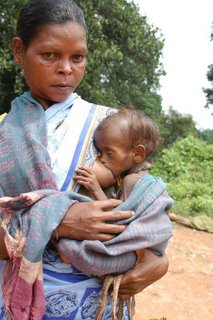
RATAN K PANI
most effective survival intervention, commercial influence on breastfeeding by baby food manufacturers and cultural practices in rural areas has been overshadowing significance of mother's milk. Ideally, infants thrive best on exclusive breastfeeding for first six months and continued breastfeeding for two years along with adequate complimentary feeding starting after six months. Statistics has revealed that breastfeeding reduces
under five child deaths to about 16 per cent in
Research has indicated that breastfed children have 40 percent more IQ than children who are not breastfed. For establishing adequate breastfeeding it is very important to have an early start within one hour of birth and to have breast milk alone as the first feed. But delaying breastfeeding and restricting it and giving others products before six months are still common practices that increase the risk of infection, allergy, long-term diseases and ultimately death. Besides this ignorance, beliefs, inadequate training, knowledge and skills of health and childcare workers add to the access to accurate information. In fact unethical marketing practices of companies, especially through advertisements of infant milk substitute and infant foods have been undermining breastfeeding resulting in increased infant malnutrition, morbidity and mortality.
Recognising this to be major public health problem, Government of India in 1992
enacted 'Infant Milk Substitutes, Feeding Bottle and Infant Foods (Regulation of Production, Supply and Distribution) Act, 1992 (IMS Act). However, in spite of the enactment of the IMS Act 1992, baby food manufacturers continued to find loopholes to
Market their products, by influencing doctors and by directly approaching breastfeeding mothers. Finally to encourage breastfeeding and keep the baby manufacturers at bay amendments were made in the IMS Act, which came into force from January1, 2004 after it was passed by the Parliament in June 2003. The highlights of the amended Act was prohibit any kind of promotion of infant milk substitutes, educate pregnant and lactating
mothers, restrict and control the use of infant milk substitutes and define roles and responsibilities of healthcare institutions and health workers to ensure optimum breastfeeding practices. It also imposed penalties including imprisonment and fine to deter doctors and manufacturers to deter them to promote milk substitutes.
Yet a lot remains to be done with Kandhmal registering the highest Infant mortality rate (IMR) followed by Malkangiri, Gajapati, Koraput. However, tribal district of Mayurbhanj has the lowest in the state despite the fact that tribals usually delay breatfeeding for the belief that colostrums present in the initial state of breast milk is bad for child health even when colostrums provides the much needed antibodies. Even studies indicate that pregnant tribal women are underfed to reduce labour pain. They believe that if the mother is well fed the baby grows in the womb and there is pain while delivering it. It is high time the district administration and state launch a IEC campaign on IMS Act and help impart accurate information on breastfeeding to prevent infant mortality.


1 Comments:
hi sir iam rajesh nayar
i like your artical very much
And
waiting for your upcoming articals
Pl feel free to mail me sir
Thank u sir.
By Anonymous, at 3:13 AM
Anonymous, at 3:13 AM
Post a Comment
<< Home